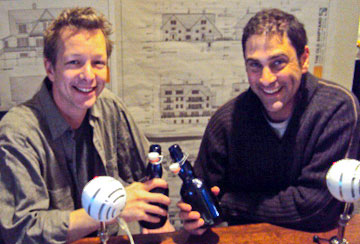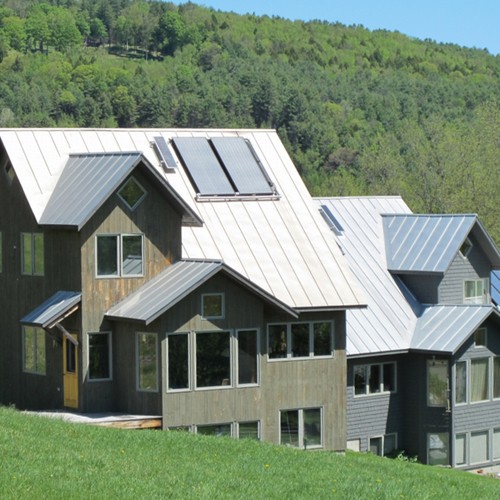
Hi, Everyone! For better or worse, Dan (Morrison) tossed us the keys to the blog, so we’re posting without a net, so to speak. Phil and I were very lucky to have a special guest for this episode: Pat Coon. Pat is co-founder of Revision Energy, and is well under way in starting a new company, Revision Heat. Pat brings to the podcast his in-depth knowledge of solar thermal design and installation, as well as his craft in home-brewing technology. Together, we discuss the logistics, benefits, and challenges of solar thermal design for the home.
To listen to GBA Radio on your iPod, right click on the green ‘Download .mp3’ words above, save ‘Link’ to your desktop, drag the file into iTunes, and enjoy the show whenever you want to!
In this solar thermal podcast we cover:
- Different kinds of solar arrays: tubes and flat plates, and when and why you might use one or the other.
- Optimal installation angles and their relevance.
- How much solar do you install? How do you maximize efficiency?
- Should you take on space heating as well as domestic hot water?
- A great discussion about “return on investment,” NOT “payback,” AND how to talk to your client about it.
- What are some typical problems to avoid? (Such as air bubbles, stagnation, solar dumps, and leaks.)
- I share my six-digit idea, the “splash pot,” and Phil shares his solar tube trellis idea with Pat. Hot Zigg!
- Then Phil leaves us with a song by the refreshingly unique Joanna Newsom.
We hope you enjoy the program.
Enjoy the previous episode of the Green Architects’ Lounge: “Architects Discuss Passive Solar Design.”
Weekly Newsletter
Get building science and energy efficiency advice, plus special offers, in your inbox.













7 Comments
Solar Water Heating
I'm in Texas (Houston), building a spec home and considering installing a solar water heater. Should I do some type of small back up system and should I even consider solar for a spec home?
Allan
Sure
I should think that a small system to take care of domestic hot water would be cash positive on the first day. You can get solar tanks that are supplemented by the boiler or even with an old fashioned electrical element within the tank. Your solar installer probably has his/her favorite way to do this.
If you’re on this site, I’m guessing you’re thinking of “going green” with this house? But since you asked that question you are worried that, on a spec home, it is you the developer bearing the brunt of the initial cost and the buyer who has to see the wisdom in the investment and therefore the added value to the home (especially since the bank appraiser might not)? Not too long ago I designed a spec house for a client here in Portland Maine (called the Redfern House) and my clients were clever and they made a page in a brochure where they took this house selling for $425,000 and compared it to a HERS 100 home of the same size at $350,000 they created an annual cost comparison. They assumed a $20K down payment from for each and ran the rest through a mortgage calculator. THEN they deducted the annual savings from our green spec home (which they could do because we had a reasonably accurate energy model) and ‘Ta Da’ they had an almost identical annual cost. It looked like numbers magic, but that’s what this Return on Investment stuff is all about.
Chris
Upside / Downside & Risk / Reward
I heard the podcast discussion on "payback". I work in high-tech (only an architecure and reomdeling ethusiast: http://greengateranchremodel.blogspot.com) and I want to give some input on ROI concepts.
I agree that "Payback" is a bad idea - however, "Break even" is a valuable thing to know. Being able to get a general handle on this helps people put things into context. Beyond all your creativity, you need to say "money went in, now money comes out".
The real deal - this is a risk vs. reward proposition...
- What am I risking? Possible cost of energy in the coming years and environmental impact. When we consider new developments in high-tech, which require cash investment, we play out the upside and downside scenarios, and then look at the broad meduim range for decision-making.
- If energy stays flat or even goes down 25%, where would you be? Modeling a drop lends credibility (chicken-little talk doesn't cut it). If it goes up 100%, where would you be? Assume 35% as a possible mid line. My main point here, is that there is not an ROI number, but a probable range.
- Another key point to discussing ROI are the inputs to the upside / downside. Inputs to energy costs: raw supply, political winds, taxation, global instability... This takes a theoretical idea of ROI into some real-world concepts. Will the middle-east go crazy (again) in the next 5 years? Will the US go the EU route and tax the life out of gas? Will global-warming make it so I don't need to heat so much? You can easily go way out here, but it's worth the thought. The main thing is to get into the same box with the customer and see how their concerns can be inputs.
TTF
Commercial Hot Water
I am building a second office building in Montana. The first building incorporated 6000w of solar electric, corebond insulation, fluorecent lighting and high quality windows. I adition to these items, I would like to include a solar hot water system to supply all hot water needs of the office. Hot water is only used for washing hands and dishes - Is it reasinable to install solar hot water without a backup source of heat (inline or tank)?
Audio is inefficient info transfer mechanism
I don't find audio to be a very efficient information transfer mechanism. I don't have much time just sitting around that I can listen for 49 minutes. Pat had a few interesting points, but I could have read those in 3 minutes. I won't listen to any more of these. I find written articles easier to use.
One of the factoids that I had trouble hearing was: how many 7' tubes does it take for a family of four? Was it 30 tubes? 60 tubes?
Great comments on the energy pyramid, and space heating not being a good investment for most people.
The problem with using ROI as a metric to measure the value of investments in energy efficiency is this: with most investments you have a good chance of getting your principal back. Whereas with solar heating, your principal is gone forever. So you can't compare a 10% CD with a 10% solar hot water heater. ROI only becomes interesting after you get payback of your principal.
I have a family of four in NM, where we have gobs of solar energy. But gas hot water costs me so little that the payback period for a $10,000 solar hot water heater is around 40-50 years. It just doesn't make any sense. Perhaps it makes more sense for someone who doesn't have natural gas.
Water Heating
Solar water heating is a great addition to building green. For the individual looking at it in the "ROI" here are some things to account for. In the commercial buildings, what is the space used for if its water usage is for occasional hand washing, like in a restroom, then a point of use demand style of electric water heater may be the most efficient. If it is a commercial kitchen a large enough one to keep up may be an issue. If there is a demand like showers, a staff kitchen and restroom sinks and the majority if not all the use is daytime business hours this will look great as an ROI. Consider bundling the points of the water usage as close as possible while being accessible to the staff. Heat loss from long runs of hot water lines would have a negative effect.
In a residence, consider the family that occupies the home. If someone gets up early in the morning, takes a shower and starts a load of laundry then heads off to work in a conditioned office and does not shower before bed then is there significant benefit to solar water heating?
I don’t want to discourage anyone from solar electric or water heating but warn against the package unit that fits everyone. When it comes to green technology it’s the Wild West out there so do your research on the contractors. If you are looking at solar electric or water heating, look at what the contractor did in the past. I know of some great roofers installing PV and tying it in to the house electrical system. This is an electrical generator. The roofer can make rock solid roof penetrations and deal easily with the nightmare of clay tiles and has an important role. Electricians are mediocre with roof penetrations especially on flat roofs but they are the right people for a safe code compliant (hopefully better) electrical installation. ROI goes in the dirt if the house catches fire or the contractor is not around to honor the warrantee.
To Dave: Absolutely. The
To Dave: Absolutely. The amount of hot water demand for an office environment is small. You could easily take care of the demand and adopt a more environmentally friendly culture for the offices. If it's super cloudy for week and cold as well, a rare occassion, then people's hands won't be as warm when they wash. If this is an office environment with water coolers, then you could look into a single temperature, circulating system, thereby getting rid of hotwater plumbing all together. This would need to be worked out with an ingeneer to get it right and make it energy and cost effective.
To Mike S: Yeah, our show really isn't so much for the focused person logging in and doing research so much as it is for someone who is listening while doing something else. You'll pick up some good stuff and will have passed the time nicely. Pat was saying either two (2) 4'x8' flat plate panels or two (2) 30 tube arrays (for a total of 60 tubes) Though I should input here that different tubes have different efficiencies. You'd get more output from Viessman tubes than you would for Apricus, for example. But Pat's is a good rule of thumb.
Your point about cheap gas is good. Ours, hear in the northeast is not nearly as cheap. And yes, the home will never cut you a check (unlees you sell it, I guess.)
But the savings are real, and they have a noteble affect on your energy bills where your climate can be extreme. Plus, gas will be gone in 40-50 years so sometime before then this will all make sense for everyone.
Log in or create an account to post a comment.
Sign up Log in